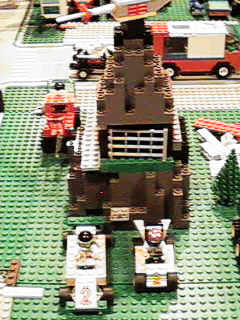One. This show did not need to come back. Two. There doesn't need to be a special streaming service from Spectrum.
Are there hordes of people signing up for Spectrum because they want to see what the Mad about You characters are up to twenty years on? It seems unlikely that people pick their cable on the basis of streaming programming, and even if they did... Mad about You doesn't exactly have the draw of The Mandalorian, does it?
I was at a holiday party a couple weeks ago, just after the debut of Disney Plus. Was I, I was asked many times, watching The Mandalorian.
No, I said, I'm over it.
Over what?
Over serialized streaming versions of things I liked when I was a kid. As far as I can tell they're all that exist. Revivals, continuations, sequels, prequels, adaptations. The Mandalorian, His Dark Materials, Mystery Science Theatre 3000, Veronica Mars, Anne with an "E", The Magic School Bus, Animaniacs, Watchmen, Carmen Sandiego, Sabrina the Teenage Witch, Girl Meets World, Battlestar Galactica, apparently twenty-seven different Marvel streaming shows for Disney Plus, and, of course, Star Trek.
And then you add on the revivals of things I could have been into but wasn't: Voltron, Samurai Jack, DuckTales, Queer Eye, Twin Peaks, Riverdale, The Tick, Gilmore Girls, Charmed, Roswell, Lost in Space, The X-Files, The Dark Crystal, Young Justice, The Clone Wars, Dune, Gremlins, Lizze McGuire...
Some of these are reboots, of course, but so many of them are revivals: shows that pick up years later with the same characters.
Why!? Well, obviously, nostalgia. And obviously it works. I couldn't move for people asking me about The Mandalorian. And obviously it works on me. There are exactly two tv shows I'm able to keep up with on a regular basis these days: Doctor Who and Star Trek, and the second of those is entirely a nostalgia-driven revival of something I liked when I was a kid... and is only about to get moreso, with the imminent release of Picard. What has Picard been up to since he last sailed into the unknown in 2003's Nemesis? I'm ready to find out, of course. So I might be opposed to this kind of thing in principle, but get the right show in practice, and I'll sign up for your dumb proprietary streaming service and watch it. The number of people I know who complain about the proliferation of unnecessary streaming services... and then turned around and picked up Disney Plus seems to indicate everyone has their weakness.
Why I don't I like these things? I guess it comes down to a feeling that, well, the moment has passed. I really, really liked Veronica Mars. But even by season two, it was clear the format was strained... and if you revive it twelve years later, is it even really the same show? Part of the enjoyment of the original was that it was about a high school girl who dared to investigate murders in her drama-ridden social circle... is a show about a 30-something P.I. the same show, even if it fills my desire to find out what happened to its main character When She Grew Up?* (I just read this spoiler-ridden article which makes it clear: no, it never can be.)
This was driven home when I posted a similar complaint on facebook a couple months ago. People popped up in the comments with what shows they wanted revived. The Middleman, Firefly, Community, Malcolm in the Middle (I think this is actually happening now), Gargoyles, Dead Like Me... Some of these, sure, whatever... but Firefly? C'mon, Joss Whedon, you had your chance, it didn't work, you had another chance with a whole movie, IT'S OVER. I can't even imagine that a Firefly revival would be very good. Everyone's seventeen years older and fatter (except for Morena Baccarin, who doesn't age), and what that show was trying to do is now done all over the place all the time. And could it even be as good as the show all the Browncoats have been imagining in their heads all this time? Of course not. The same friend is the one who suggested Community, though, so obviously his judgement is suspect.
I think these revivals also annoy me because there's less room for something dynamic and interesting. Adaptations can put very new spins on old material: the world would be a lesser place without, say, Battlestar Galactica. But revivals are by their nature backward-looking. This isn't reinventing an old story for a new age, but prolonging an old story in spite of a new age.
You might say, Steve, just don't watch these shows if they don't interest you. And, sure, yeah, I will probably never watch The Mandalorian or WandaVision, and I will certainly never watch Mad about You. But I think a lot about this thing that a friend of mine said:
Like, yes, I can not watch them... but even the few I do watch suck my personal bandwidth away from other, more original things-- and worse, culturally, I feel like our bandwidth is sucked up by them. If everyone is talking about Baby Yoda and the Skeksis, how will I know about what new original shows exist? How will they even get made?
All of this is to say: they can bring back Wonderfalls. That's a show cut down in its prime that utterly deserves five more seasons of brilliance.
But that's it. No more. Especially not Mad about You; maybe I just hallucinated Lisa Peakes saying that, and we're all safe.
#297: What old television shows would you bring back?
* Alternate title for this post, but I decided it didn't quite work: "A long time ago we used to be viewers, but I haven't watched you lately at all."








































